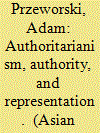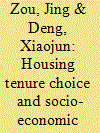|
|
|
Sort Order |
|
|
|
Items / Page
|
|
|
|
|
|
|
| Srl | Item |
| 1 |
ID:
172652


|
|
|
|
|
| Summary/Abstract |
Representation is always a dynamic relation, a tatonnement, in which the represented adjust their preferences on the basis of beliefs induced by the representatives. All rulers—those selected in clean elections, those who hold such ceremonies without putting their power at stake, and those who do not even bother to hold them—claim to have reasons to be followed, and people are willing to follow them if they believe these are good reasons. Thus, individual preferences, “wills,”are influenced by the relation of representation. The controversial issue is whether the relation of representation can be assessed when preferences are endogenous, in particular when people are not exposed to a plurality of reasons.
|
|
|
|
|
|
|
|
|
|
|
|
|
|
|
|
| 2 |
ID:
187888


|
|
|
|
|
| Summary/Abstract |
Migrants' socio-economic integration is taken as one of important forms for common prosperity. And it is a crucial factor for social harmony and stability. However, the association between housing tenure choice and migrants' socio-economic integration does not receive enough attention. Based on 2017 China Migrants Dynamics Survey (CMDS), it is found migrants' socio-economic integration mainly consists of the following three aspects: Economic integration, socio-cultural integration and psychological integration. Compared with migrant renters, the socio-economic integration of migrants with houses is rather higher, while migrants' level of socio-economic integration, who live in employee's dormitories, is comparatively low, even after controlling the endogenous by using PSM and IV method. Further study indicates that the effect of housing tenure choice on migrants' socio-economic integration partly affects their settlement intention, integration will, local capital and labor supply. Heterogeneity analysis shows that new generation have a negative effect on the role of homeownership on migrants' socio-economic integration, while living in eastern China and the development of digital economy can both strengthen the effect of housing tenure choice on migrants' socio-economic integration.
|
|
|
|
|
|
|
|
|
|
|
|
|
|
|
|
| 3 |
ID:
147080


|
|
|
|
|
| Summary/Abstract |
By the end of the twentieth century, a scholarly consensus emerged around the idea that oil fuels authoritarianism and slow growth. The natural abundance once thought to be a blessing was unconditionally, and then later only conditionally, a curse for political and economic development. We re-examine the relationship between oil wealth and political regimes, challenging the conventional wisdom that such natural resource rents lead to authoritarian outcomes. We contend that most efforts to examine the causal linkages between natural resource abundance and political regime have been complicated by the likelihood that both democracy and oil revenue are endogenous to the industrialization processes itself, particularly in its developmentalist form. Our quantitative results, based on an analysis of global data from 1970 to 2006, show that both resource endogeneity and several mechanisms of intraregional regime diffusion are powerful determinants of democratic outcomes. Qualitative evidence from the history of industrialization in Latin America yields support for our proposed causal claim. Oil wealth is not necessarily a curse and may even be a blessing with respect to democratic development.
|
|
|
|
|
|
|
|
|
|
|
|
|
|
|
|
|
|
|
|
|